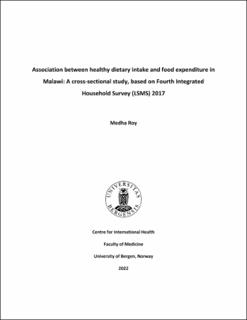| dc.contributor.author | Roy, Medha | |
| dc.date.accessioned | 2023-01-24T03:20:55Z | |
| dc.date.available | 2023-01-24T03:20:55Z | |
| dc.date.issued | 2022-08-31 | |
| dc.date.submitted | 2023-01-23T09:27:54Z | |
| dc.identifier.uri | https://hdl.handle.net/11250/3045544 | |
| dc.description.abstract | Safe, nutritious dietary intake is crucial for developmental stage of life. Healthy dietary intake can alleviate the malnutrition problem and unhealthy dietary intake along with sedentary lifestyle can cause the rise of non-communicable diseases in low- and middle-income countries. Food expenditures impact the dietary intake of a household. This study investigated household information from 2508 households taken from Malawi Fourth Integrated Household Survey (IHS4), 2016-17 which is a part of the World Bank Living Standards Measurement Studies (LSMS). The aim of this study is to assess the association between food expenditure and the healthy dietary intake of Malawian households and the potentiality of attaining healthy diet within limited food expenditure. Food consumption score can be used as measurement of a healthy diet. In this study food consumption score was developed and calculated to understand the dietary intake of the households. After performing a general linear regression with controlling the covariates, significant association was found between healthy dietary intake and food expenditure (p=0.000). About 25 percent of the households were able to attain healthy dietary intake with limited food expenditure. Households with higher educationally qualified householder had healthier food consumption than households with householder with no education. Households from urban settings had healthier dietary intake than rural households. This study also produced the number of Malawian households with poor dietary intake which can be used to identify the target population. Factors enabling population to attain healthier diet within limited food expenditure should be investigated. Food price intervention, food security intervention, sustainable income generating activity, cost effective production of healthy food can be considered for this population. | |
| dc.language.iso | eng | |
| dc.publisher | The University of Bergen | |
| dc.rights | Copyright the Author. All rights reserved | |
| dc.subject | Affordability | |
| dc.subject | Malawi | |
| dc.subject | Food consumption score | |
| dc.subject | Food expenditure | |
| dc.subject | Healthy dietary intake | |
| dc.title | Association between healthy dietary intake and food expenditure in Malawi: A cross-sectional study, based on Fourth Integrated Household Survey (LSMS) 2017 | |
| dc.type | Master thesis | |
| dc.date.updated | 2023-01-23T09:27:54Z | |
| dc.rights.holder | Copyright the Author. All rights reserved | |
| dc.description.degree | Master Thesis in Global Health | |
| dc.description.localcode | INTH395B | |
| dc.description.localcode | MAMD-GLOB | |
| dc.subject.nus | 769913 | |
| fs.subjectcode | INTH395B | |
| fs.unitcode | 13-26-0 | |
